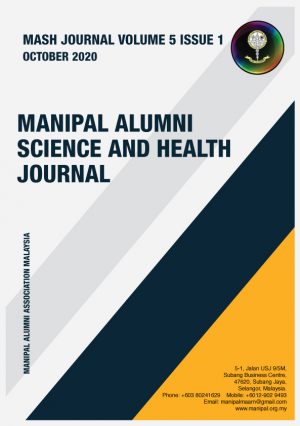Abstract:
Introduction:
Orthorexia nervosa (ON) is a new eating behaviour disorder which is characterized by pathological obsession of biological pure food, free from artificial substances such as pesticides and herbicides. [1] The prevalence of ON is higher among the health professions and also medical students.
Objective:
To find the prevalence of ON (dependent variable) and its risk factors (independent variable) such as age, anxiety level, gender, BMI, ethnicity, vegetarian or non-vegetarian among the undergraduate medical students in private medical college, Malaysia.
Methods:
This cross-sectional study was carried out from June to July 2019 among 202 medical students in Melaka Manipal Medical College, Muar, Johor, Malaysia. The research is carried out by distributing a questionnaire that consists of 3 sections, which are social-demographic details, Beck Anxiety Inventory (BAI) questionnaires and validated ORTO-15 questionnaires. Chi-Square test and multiple logistic regression were used to analyse the data and P<0.05 was accepted as statistically significant.
Results:
Out of 202 students participated in the study, 66.83% of the students are suffering ON. However, there is no significant association between age (p-value 0.073), gender (p-value 0.143), diet (p-value 0.538), ethnicity (p-value for malay, indian and others are 0.991. 0.314 and 0.057 respectively), BMI (p-value for underweight <18.5, overweight >25.0 are 0.441 and 0.526 respectively) and anxiety level (p-value for mild, moderate and severe are 0.621, 0.150 and 0.699 respectively) and ON.
Conclusion:
Most of the medical student in the college are suffering from ON. There are no significant association between ON and the risk factors such as age, gender, ethnicity, diet, BMI and anxiety level.

